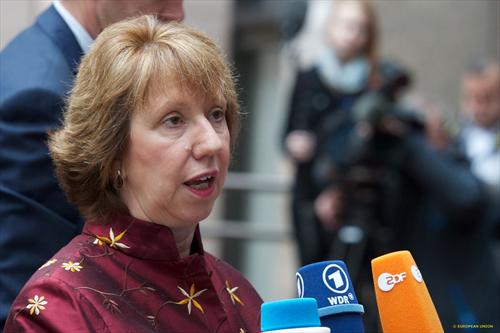Twenty-one persons to be sanctioned in the list of the EU28 Foreign Ministers, who chose a soft approach, unlike the US. Putin to refer to Russian Parliament – if he will proceed with the annexation of Ukraine, new measures could be issued by the European Council later this week
Eight Crimean politicians, the current Prime Minister and Mayor of Sebastopol among them, ten persons belonging to the Duma or to the Russian Federation Council, and three soldiers, the commander of the Russian Fleet on the Black Sea among them: here’s the black list of 21 persons targeted by the forthcoming EU sanctions, following the referendum for Crimean independence and in view of the possible annexation of the peninsula to Russia. The Foreign Affairs Council Meeting has established to introduce six-month travel restrictions and an asset freeze against persons responsible for actions undermining or threatening the territorial integrity, sovereignty and independence of Ukraine. At least, some of those persons: reading the list, it is clear that the European Union has so far chosen a soft approach towards Moscow, given that “the list does not include members of the government, journalists, nor representatives of companies,” underlined the Italian Foreign Minister, Federica Mogherini, who has supported this kind of approach together with her German counterpart, Frank-Walter Steinmeier. Nothing to do with the hypothetical lists including thousands of names – for instance, top managers of Russian energy companies such as Gazprom – whispered in the rumours before the Meeting.
In the meantime, the US has also published its list of sanctions, highlighting the weakness of the European decisions. Eleven persons targeted by the White House, seven Russian and four Ukrainian citizens (including the former President Viktor Yanukovich). President Putin does not appear in the list, yet some of his closest collaborators do, such as the Deputy Premier Dmitry Rogozin and two of Putin’s personal counsellors, Vladislav Surkov and Sergey Glazyev. Perhaps Putin is not listed directly, yet he was hit “in his house,” said sources from Washington. The European Union is still on the threshold. “I do not think it is necessary to talk about strong or weak approaches,” said High Representative of the Union for Foreign Affairs and Security Policy, Catherine Ashton, “this is the approach we chose,” hoping for a “de-escalation of the situation.”
The shared point of view is to wait for Russian decisions: Putin is to talk to the Duma later today and if, as many think, he will go for formal procedures for the annexation of Crimea, new decisions shall be taken by the Meeting of Heads of State or Government on Thursday and Friday. During the summit, as confirmed in the Council conclusions, the signing of the political provisions of the Association Agreement with Ukraine will take place. Furthermore, the “commitment to proceed to the signature and conclusion of the remaining parts of the Agreement which together with the political provisions constitute a single instrument” was confirmed. The EU Foreign Ministers wanted to warn the new Ukrainian government too: Ukrainian authorities are required to continue to reach out to all Ukrainian regions and population groups, ensuring “the full protection of the rights of persons belonging to national minorities,” reads the text. For monitoring the situation, the Council considers that there is an “urgent” need for an international presence on the ground throughout Ukraine, supporting the swift deployment of an OSCE (Organization for Security and Co-Operation in Europe) Special Monitoring Mission to Ukraine.
Letizia Pascale











![Il commissario per l'Economia, Valdis Dombrovskis, in conferenza stampa a Strasburgo [12 febbraio 2025]](https://www.eunews.it/wp-content/uploads/2025/02/dombro-250212-120x86.png)
